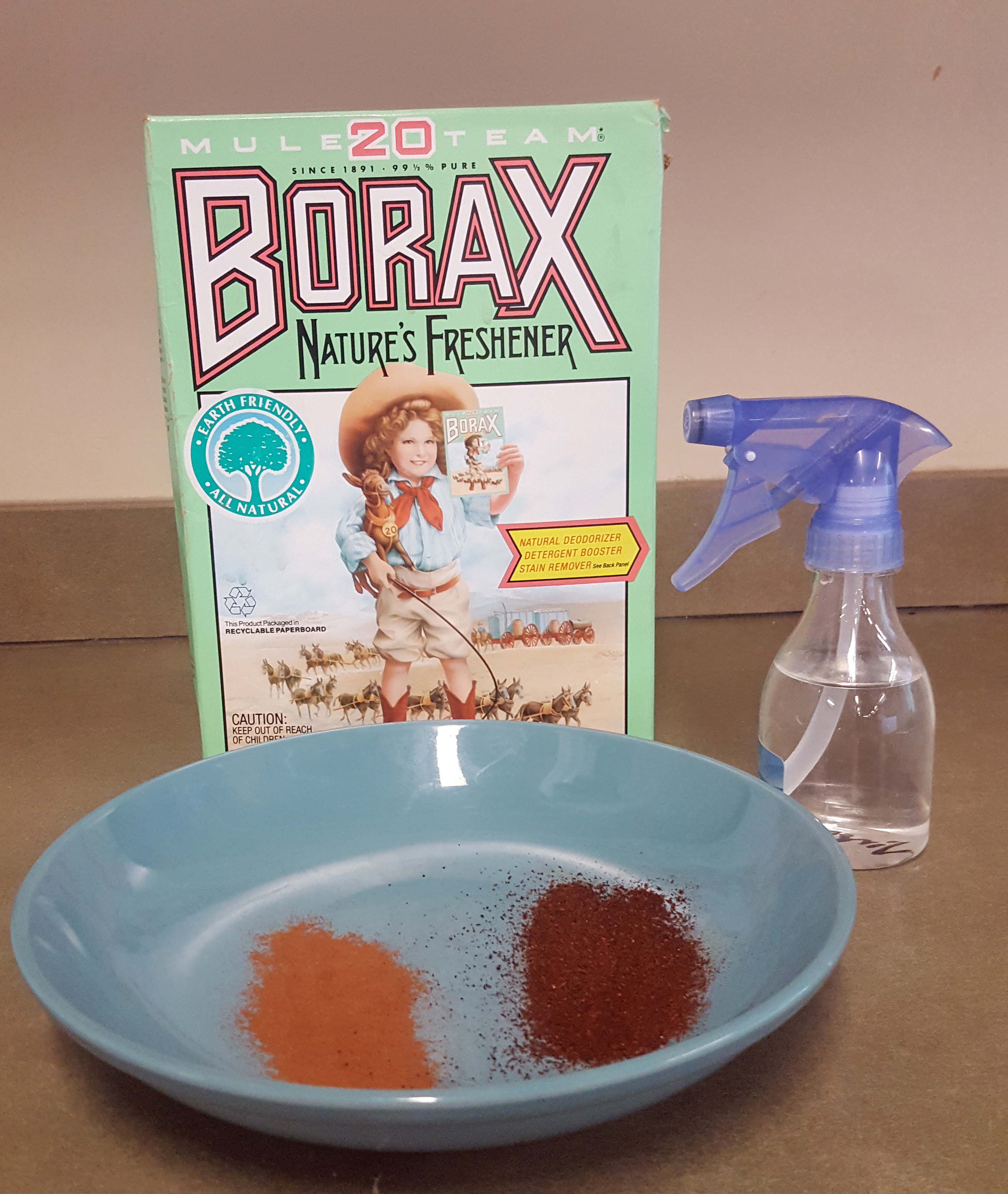When you see little black dots marching across your kitchen wall (or windowsill, sink or floor), reach for the magnifying glass, not the can of bug spray.
Ants come inside our houses when their colonies wake up in spring. As they clean out winter flotsam from their home, they seek the nearest source of water and food, inside the structure they inhabit (house walls) – and usually, if not intentionally, provided by us. The tiny “sugar ants” we meet as weather warms may nest in wall spaces year-round, but they rarely come indoors except in early spring or periods of drought. Determining where they come in, and removing the attractions, are a Green and healthy way to deal with unexpected visitors.
Non-toxic, ecological control is simple. Keep calm, clean thoroughly – and observe!
- Remove all sources of food that ants are after. Some residue is attracting them, even if you can’t see it. Ants are after things like the sweet dried juice from cutting fruit, sandwich crumbs, or the tasty ring left under a beverage glass. Keep your counter, backsplash and sink areas perfectly clean, at least until the ants move outdoors. They may also be seeking water. Checking for damp spots may alert you to leaks, a way that ants can help prevent home damage!
- Watch the ants: figure out where they are coming from, and where they’re going. This will help you find (and clean) what’s attracting them. Most importantly, your brave investment in a bit of Nature Observation will help you appreciate why the quick-fix of toxic bug spray is not necessary, and enable you to pinpoint where to block their foraging route.
- Block ant access to the tasty refreshment they seek by laying a line of cinnamon across their path, such as from the tiny space alongside window trim or a crack in tile grout. Cinnamon? Yes. Ants will not cross it. But cinnamon won’t harm people or pets, it’s a food-grade deterrent you probably have on hand, and it can be neatly wiped up once the ants move on to their preferred living environment, outdoors. A line of cayenne pepper or borax will work too, but may upset a curious cat.
 Ants, being social-colony creatures, continually send scouts out to find resources that will benefit all. You will discourage the few intrepid ants that find a way around your spice blockade by keeping a spritz bottle of soapy water handy, to immobilize these individual ants with the spray. Ants communicate with chemical messages. It’s kind of macabre, like mounting the heads of convicted thieves on spikes along London Bridge, but I believe the practice of stopping ant scouts in their tracks, dead or otherwise, uses the ants’ own communicative strategies to let the colony know you don’t want them. Plus that soapy water contributes to all-important preventative cleaning!
Ants, being social-colony creatures, continually send scouts out to find resources that will benefit all. You will discourage the few intrepid ants that find a way around your spice blockade by keeping a spritz bottle of soapy water handy, to immobilize these individual ants with the spray. Ants communicate with chemical messages. It’s kind of macabre, like mounting the heads of convicted thieves on spikes along London Bridge, but I believe the practice of stopping ant scouts in their tracks, dead or otherwise, uses the ants’ own communicative strategies to let the colony know you don’t want them. Plus that soapy water contributes to all-important preventative cleaning!
The ants that come into our homes in spring are in the species Formica, named for the bitter smell they give off, like formic acid. Their common name “sugar ants” refers to their attraction to sweets. Wall colonies of these tiny ants pose no threat to humans; they are just a nuisance, and they give some people the creeps. Ants of concern are their much larger Carpenter Ant cousins, insects that tunnel into wood, weakening structures and potentially causing significant damage. There’s no mistaking the hefty half-inch long black or reddish Carpenter ants (species Camponotus). They are wingless, with long antennae. If you find them marching around your home, extermination is warranted.
Jean Ponzi, Green Resources Manager, says, "I don’t like to use products that kill an ant colony, and I don’t mind their brief vernal visits. But if you feel you cannot stand them, look for products with Borax as the active ingredient. Borax is a natural mineral that is found in many consumer products and has been used safely by homeowners for years." Its inert ingredients are sweet food-based products similar to pancake syrup. Worker ants take the sweet bait back to the colony, where eating it will kill the ants, usually over a couple of weeks. The product that won’t harm you; sold in hardware and home improvement stores.
For more green living tips like this contact us today at greenresources@mobot.org or (314) 577-0246. And visit our handy FAQs online.